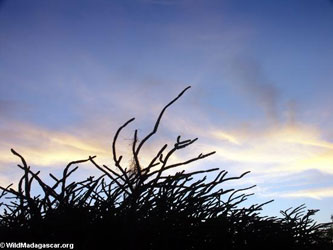Madagascar’s forests are recovering due to social institutions
Madagascar’s forests are recovering
wildmadagascar.org
May 2, 2007
Some of Madagascar’s most biologically rich forests appear to be recovering according to research published in the open-access journal PLoS ONE. The study also offers new insight in the forces behind deforestation and the social context of reforestation efforts.
The dry forests of southern and southwestern Madagascar have the highest level of plant endemism on the island, with 48% of the genera and 95% of the species found nowhere else on the planet. The area is so biodiverse that it listed as one of the 200 most important ecological regions in the world. Nevertheless, the region has suffered from high rates of deforestation for agriculture, cattle herding, timber harvest and charcoal production. Little of the dry forest is under any form of protection.
Using Landsat satellite images and ground surveys, scientists from Sweden and the University of Antananarivo in Madagascar found that “loss of forest occurred mainly in areas with insecure property rights, while areas with well-defined local norms, rules and property rights for forest management showed either regenerating or stable forest cover,” according to a statement from Stockholm University.
 Spiny forest vegetation in Madagascar. Photo by Rhett A. Butler |
“We were surprised to find the highest deforestation rates in an area with low human population density and large distance to markets, while the area with highest population density had stable forest cover,” said Thomas Elmqvist, Professor at the Stockholm Resilience Centre, Sweden, and lead author of the study. “Our study clearly shows the importance of an increased understanding also of the social context behind forest regeneration.”
“We now know a fair amount about the human social context in which tropical forest loss is embedded, but very little is known about the role of social institutions in influencing regeneration of tropical forests,” added Maria Tengö from Stockholm university and a co-author of the study.
The results suggest that property rights may play a critical role in driving forest recovery. Property rights are one of the key areas of focus under the Millennium Challenge Account, an American aid grant recently awarded to Madagascar.
“Our study emphasizes the large capacity of a semi-arid system to spontaneously regenerate, triggered by decreased pressures, but where existing social institutions mitigate other drivers of deforestation and alternative land-use,” the authors conclude.
Citation: Elmqvist T, Pyykönen M, Tengö M, Rakotondrasoa F, Rabakonandrianina E, et al (2007) >a target=_blank href=http://www.plosone.org/doi/pone.0000402>Patterns of Loss and Regeneration of Tropical Dry Forest in Madagascar: The Social Institutional Context. PLoS ONE 2(5): e402. doi:10.1371/journal.pone.0000402







